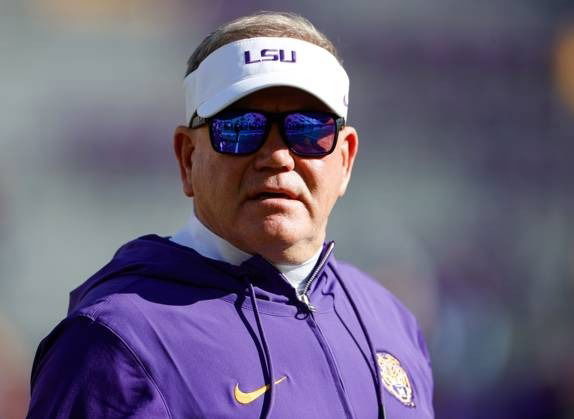
Imago
Source: Imago

Imago
Source: Imago
“I hate to say this … I dealt with a lot of people offering our players a lot of opportunities after that,” Nebraska coach Matt Rhule had said throwing light on a sad reality teams often face after spring games. In the cut-throat world of lucrative NIL deals induced poaching at an all-time high, it’s also become imperative for front offices to ensure that’s not the case. The solution? A simple dodge. Promptly, Nebraska announced they would pull out of this year’s spring game. But they weren’t the only ones. Several teams followed suit—including LSU. But, if you ask Brian Kelly, he sorely disagrees that the poaching notion has got anything to do with his decision. But before we get to that…
Watch What’s Trending Now!
For the unversed: It was Lane Kiffin who essentially put his foot down first. During the 2024 season, Ole Miss’ spring game was everything but just that. A hot dog cart, a tug-of-war championships, golf cart races—you name it there would be a setup ready to entertain people. Insiders, though, understood the clear motive behind the spectacle. To distract. There were evidently no depth charts for the community to analyze, no “full-contact games” for opposing staff members to scout, and no eyes closely following the players ready to pounce and poach. As CBS Sports’ John Talty rightly put it, “Kiffin and Ole Miss were ahead of the curve.” And, this year also, 19 Power 4 programs have opted out including Oklahoma, West Virginia, Ohio State, Texas, Missouri, NC State, Florida, USC, Nebraska, Ole Miss—and last but not the least, LSU, among others.
Notably, Kelly’s team will host an open practice on April 12, followed by an autograph session for fans. During a press conference on Saturday (March 15), the coach took some time to explain that he didn’t what exactly led to the decision…
ADVERTISEMENT
With a transfer portal window opening up shortly following the end of the spring practice, the risk of losing your gems is not totally delusional for the coaches, but Kelly, regardless, is fearless in his takes. When he was asked if he was bothered by the popular fear narrative, the LSU head coach came clean, saying, “I wasn’t worried about that. I mean, I think if you’re going to lose a player, it’s not because of what they put on film in the spring ball; it’s because of what’s happened, you know, throughout the entire semester or year. I think that was just an easy sound bite to, you know, get out from under having the spring game. That’s just my opinion.”
It is interesting that Kelly downplays the role of spring games in rival programs tapping up each other’s players. Rhule, on the contrary, appeared to be an open book when discussing the same. “The word ‘tampering’ doesn’t exist anymore. It’s just absolute free, open, common market. And so I don’t necessarily want to open up to the outside world. I don’t want these (other coaches) all being able to watch our guys and say, ‘Wow, he looks like a pretty good player. Let’s go get him.’”
Talking about his own decision to skip the Spring Game, the coach further said, “To go out and bring in a bunch of new players and then showcase them for all the other schools to watch. That doesn’t make a lot of sense to me.” University of Central Florida’s Athletic Director, Terry Mahajir also explained the situation in nine simple words. “It’s like the Home Shopping Network of the spring.”
ADVERTISEMENT
Well, what can we say? Tampering is the reality of college football. I mean who doesn’t remember Maalik Murphy? To remind you, the then-Texas Longhorns quarterback’s strong performance led to tampering from multiple SEC programs. Though he stayed with the team thanks to a competitive NIL offer, the player left the very next year for the Duke Blue Devils.
Top Stories
Drake Maye Reveals Shoulder Injury Update as Patriots QB Announces News On Super Bowl Availability

NFL Sends Muted Warning to Bad Bunny Before Super Bowl Halftime Performance Amid ICE Controversy

PGA Tour Split Into Two as Scottie Scheffler Confirms Stance on Patrick Reed’s Return

Travis Kelce Makes Sporting Return as Teammate Gives Update on Chiefs TE’s Retirement

Tempers Boil Over as Punches Fly in Winthrop vs High Point WBB Game

Jaxson Hayes vs Mascot: Everything You Need to Know About the Entire Episode of Altercation, Suspension and More

Notably, this also comes amid the Oregon Ducks being accused of tampering offering players as high as $700k to join their program. As per what former Boise State offensive coordinator Dirk Koetter said in January, “Let’s get some numbers out there. Our salary cap is $2 million. And that’s up from maybe something like $1.6 million last year, but it’s around $2 million. Every calendar year, that’s what it is right now, and trying to grow it. But the people we’re competing against, maybe not in our current conference, but where we’re going and who we’re expected to compete against, it’s as high as $20 million.”
ADVERTISEMENT
“I know for a fact that just last week, after the Fiesta Bowl, one of the key starters on defense got a call from the Oregon Ducks offering him $700,000,” he had further complained.
But there we go! No spring games for the Tigers. However, the Tigers’ open practice includes some significant changes in the game structure and format for the greater good of the players.
ADVERTISEMENT
Brian Kelly tries to get the newbies on their tempo through an unconventional Spring practice
The first and foremost change will be in the discontinuity of the events. The plan is to break the team’s final practice into more situational work. Also, special teams will be at the center of attention in these games, playing a pivotal part in the early season practice. But the most glaring difference between the traditional and the current version of the Spring game will be the scrimmage format.
”The April 12 game is certainly going to be an opportunity for fans, you know, to see our team, but it’ll be in a different format. It will be, for us, a culmination of the work that we’re going to be doing. It’ll be a scrimmage, but it’ll be controlled situationally,” Kelly said, explaining the advantages of a non-split approach. ”You’ll get a chance to see all of your favorite players and be able to be part of what would be a culmination of the 15 practices, but there’ll be live scrimmaging, but it’ll be in a different format.’‘
Kelly basically wants to turn the spring game into a casual spring practice design, highly focused on giving the young players a chance to add more reps before they see the field in a regular season. Kelly has been eying a strong rebound following a 9-4 slump last season, and getting his weapons honed in a less serious setup is the most relevant thing he can do to ensure the victory.
ADVERTISEMENT
ADVERTISEMENT
ADVERTISEMENT
ADVERTISEMENT
.png)
.png)
.png)



